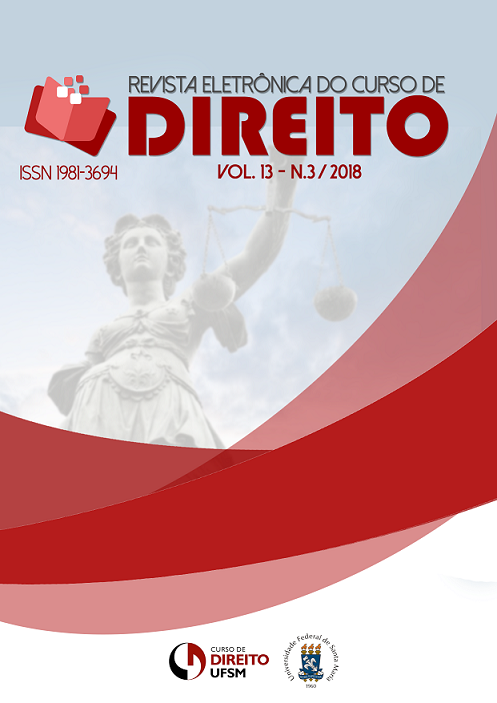PEOPLE WITH MENTAL OR INTELLECTUAL DISABILITIES: A STUDY ON MARRIAGE AND STABLE UNION IN THE PERSPECTIVE OF THE BRAZILIAN LAW OF INCLUSION
DOI:
https://doi.org/10.5902/1981369430632Keywords:
Civilian capacity, Wedding, Family, Inclusion, Stable union.Abstract
This work is subject to the legitimacy of civil marriage and the stable union of people with mental or intellectual disabilities, taking as references the Brazilian inclusion law, the principle of minimal intervention in family relationships and the boundaries of curatorship. The article is scoped to understand the demarcation of the legal extent around the will declared by curators, responsible and supporters, in front of the precepts described in articles 1513, 1550, §2nd, of the Civil Code, article 755, caput and paragraphs of the Code of Civil Procedure. For this, it is employed the methodology dialectical-descriptive and explanatory, founded in the study of the variables pointed out by doctrine, legislation and jurisprudence, in addition to reflection on the evolution of thought around the requirements of existence, validity and effectiveness of matrimony and the pacts of coexistences recorded in the registry of natural people.
Downloads
References
AMERICAN PSYCHIATRY ASSOCIATION. Diagnostic and Statistical Manual of Mental Disorders - DSM-5. 5th.ed. Washington: American Psychiatric Association, 2013.
BRASIL. Lei 13.146 de 6, de julho de 2015. Institui a Lei Brasileira de Inclusão da Pessoa com Deficiência (Estatuto da Pessoa com Deficiência). In: Diário Oficial da República Federativa do Brasil, Brasília, DF, 07 jul. 2015. Disponível em: <http://www.planalto.gov.br/ccivil_03/_ato2015-2018/2015/lei/l13146.htm> Acesso em: 09 set. 2018.
COUNCIL OF EUROPE PUBLISHING. Commissioner for human rights. Who gets to decide? Right to legal capacity for persons with intellectual or psychosocial disabilities. France; Council of Europe Publishing, 2012
EUROPEAN UNION AGENCY FOR FUNDAMENTAL RIGHTS. Legal Capacity of Persons with Intellectual Disabilities and Persons with Mental Health Problems. Luxembourg: Publications Office of the European Union, 2013.
FRANKENA, Willian K. Ética. 2. ed., tradução de Leônidas Hegenberg e Octanny da Mota, Rio de Janeiro: Zahar, 1975.
FINA, Valentina Della. The United Nations Convention on the Rights of Persons with Disabilities: a commentary. Rome, Italy: Springer International Publishing, 2017.
KANT, I. A Metafísica dos Costumes. Trad. de Edson Bini. 1 ed. Bauru: Edipro, 2003.
MACHADO, Diego Carvalho. Capacidade de Agir e Direitos da Personalidade no Ordenamento Jurídico Brasileiro: o caso do direito à privacidade. Revista Brasileira de Direito Civil. Vol. 8, abr./2016, p. 47-80.
MENGONI, Luigi. Diritto e valori. Bologna: II Mulino, 1985.
MORAES, Maria Celina Bodin de; CASTRO, Thamis Dalsenter Viveiros de. A autonomia existencial nos atos de disposição do próprio corpo. Revista Pensar, Universidade de Fortaleza, vol. 19, n. 3, set./dez. 2014, p. 779-818.
ORGANIZAÇÃO DAS NAÇÕES UNIDAS. Convenção sobre os Direitos das Pessoas com Deficiência (CDPD). 2009.
PAPA JOÃO PAULO II. Código de Direito Canônico. 4 ed. Lisboa, Portugal: Conferência Episcopal Portuguesa, 1983.
PEREIRA, Rodrigo da Cunha. Princípios fundamentais norteadores do direito de família. Belo Horizonte: Del Rey, 2006.
PÉREZ BUENO, Luis Cayo; LORENZO GARCÍA, Rafael. Los difusos limites de la discapacidad en el futuro. Hacia un nuevo estatuto de la discapacidad. In: Tratado sobre discapacidad. LOURENZO, Rafael de. y PÉREZ BUENO, Luiz Cayo (Diretores). Navarra: Editorial Aranzadi, SA, 2007.
PIOVESAN, Flávia. Introdução ao sistema interamericano de proteção dos direitos humanos: a convenção americana de direito humanos. In: GOMES, Luiz Flávio; PIOVESAN, Flávia (Coord.). O sistema interamericano de proteção dos direitos humanos e o direito brasileiro. São Paulo: Revista dos Tribunais, 2000.
RAWLS. John. Justice as Fairness: a restatement. Cambridge: Harvard University Press, 2001.
RAWLS. John. Political Liberalism. New York. Columbia University Press, 2005.
RODOTÀ, Stefano. La vita e le regole: tra diritto e non diritto. Milão: Feltrinelli, 2006.
ROSS, W. D. The right and the Good. Oxford: Clarendon, 1930.
TEPEDINO, Gustavo; BARBOSA, Heloisa Helena; MORAES, Maria Celina Bodin. Código Civil Interpretado, conforme a Constituição da República, Volume 1: Parte Geral e Obrigações. 2ª ed., rev. e atual. 1ª Tiragem, Rio de Janeiro: Renovar, 2011.
TESÓN, Inmaculada Vivas Tesón. Más allá capacidade de entender y querer... Um análisis de la figura italiana de la administración de apoyo y una de apoyo y una propuesta de reforma del sistema tuitivo español. Observatório Estatal de la Discapacidad. Olivenza: FUTUEX, 2012.
SCHALOCK, Robert L.; LUCKASSON, Ruth A.; SHOGREN, Karrie A. The Renaming of Mental Retardation: Understanding the Change to the Term Intellectual Disability. Intellectual and Developmental Disabilities, v. 45, n. 2, abr. 2007, p. 116-124.
SCHULZE, Marianne. Tomada de decisões: somente para quem está no poder? Revista Deficiência Intelectual – DI, ano 5, n. 8, jan./jun. 2015, p. 4-10.
STANZIONE, Pasquale. Capacità (diritto privato). In: AUTORINO, Gabriela; STANZIONE, Pasquale. Diritto civile e situazioni esistenziali. Torino: Giappichelli, 1997, p. 56.
UNITED NATIONS. General Assembly Human Rights Council (2009). Thematic Study by the Office of the United Nations High Commissioner for Human Rights on enhancing awareness and understanding of the Convention on the Rights of Persons with Disabilities, A/HRC/10/48, 26 January 2009, paragraph 43.
UNITED NATIONS. Universal Declararion of Human Rights. 217 (III) A. Paris, 1948. Disponível em: <https://www.ohchr.org/EN/UDHR/Documents/UDHR_Translations/eng.pdf> Acesso em 30 ago 2018.
WEBER, Thadeu. A ideia de um mínimo existencial de J. Rawls. Kriterion, Revista de Filosofia, Belo Horizonte, nº 127, Jun./2013, p. 197-210.
XAVIER, Fernanda Dias. União Estável e Casamento: a impossibilidade de equiparação à luz dos princípios da igualdade e da liberdade. Dados eletrônicos. Brasília, TJDFT, 2015. Disponível em: <http://www.tjdft.jus.br/institucional/escola-de-administracao-judiciaria/plano-instrucional/e-books/e-books-pdf/uniao-estavel-e-casamento>. Acesso em: 30 abr. 2017.
Downloads
Published
How to Cite
Issue
Section
License

Este obra está licenciado com uma Licença Creative Commons Atribuição-NãoComercial-SemDerivações 4.0 Internacional.








